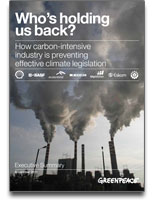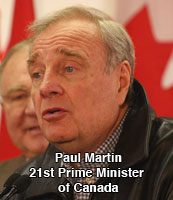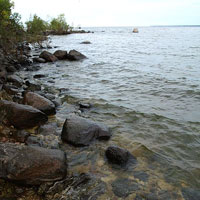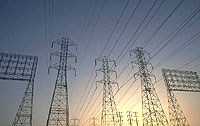
News |
- Economists Support Occupy Movement
- Reality Checks Start Again - Single Issue Audits
- BC First Nations Win Fish Lake Injunction
- There's A New World in the Making
- Climate Polluters Block Climate Solutions
- Ring of Fire First Nations Seek Shared Decisions and Benefits
- Prime Minister and Bank Governor Support Occupy Movement
- Lake Winnipeg Regulation Hearings - Schedule?
- Where Is The Bipole III Environment Statement?
- Tembec Sells Pine Falls Plant
- TransCanada Keystone XL Pipeline Delayed
- Six Park Reserves Under Review
| Economists Support Occupy Movement | 3 December 11 |
 On November 13th 2011, economists from the University of Massachusetts Amherst drafted an open statement to the Occupy Wall Street movement pledging their support. Since then, more than 300 economists from around the world have added their names.
On November 13th 2011, economists from the University of Massachusetts Amherst drafted an open statement to the Occupy Wall Street movement pledging their support. Since then, more than 300 economists from around the world have added their names.Acknowledging the current economic crisis, the economists "extend our support to the vision of an economy that works for the people, for the planet and for the future." Citing that a good, working economy provides basic security, a safety net, services and rights for citizens, the economists say that “economics as an institution did not give sufficient warning, and did not inform the decision making” when the economic crisis hit. The economists “declare our solidarity with the Occupiers who are exercising our democratic right to demand economic and social justice.” Signatures from economists around the world continue to be added, with Canadian economists’ names starting to appear on the list. Watch Econ 4 Introduction videoView December 1, 2011 Common Dreams article View Economists’ Statement on OWS with Signs-ons Source:
Common Dreams, Econ4.org
|
|
 Print version Print version |
Top |
| Reality Checks Start Again - Single Issue Audits | 3 December 11 |
 Manitoba Wildlands began posting 'Reality Checks' about Manitoba’s environment, energy, lands and waters issues early in 2011. Each Reality Check is an update and audit for one issue. Many of the topics covered were relevant in advance of the October 3, 2011 provincial election. Twenty three reality checks were available before the election.
Manitoba Wildlands began posting 'Reality Checks' about Manitoba’s environment, energy, lands and waters issues early in 2011. Each Reality Check is an update and audit for one issue. Many of the topics covered were relevant in advance of the October 3, 2011 provincial election. Twenty three reality checks were available before the election.In November 2011 Manitoba Wildlands resumed posting Reality Checks. Recent topics include: the need for ATV policy that is enforced; the number of upcoming Hydro projects in Manitoba; protecting lake sturgeon, and policy to turn off home heating during the winter. Reality Checks are on the Manitoba government page in the Manitoba Wildlands website, where 2011 election surveys of all political parties are also posted. View Manitoba Wildlands 2011 Reality ChecksSource:
Manitoba Wildlands
|
|
 Print version Print version |
Top |
| BC First Nations Win Fish Lake Injunction | 3 December 11 |
 The Tsilhoquo'in First Nation has been granted an injunction preventing Taseko Mines from working around its proposed gold and copper mine near Williams Lake, British Columbia. All Tsilhqot'in First Nations support the legal action for an injunction. The Canadian federal government recently ordered a new environmental assessment for the second mine proposal. The federal government did not approve the first mine proposal.
The Tsilhoquo'in First Nation has been granted an injunction preventing Taseko Mines from working around its proposed gold and copper mine near Williams Lake, British Columbia. All Tsilhqot'in First Nations support the legal action for an injunction. The Canadian federal government recently ordered a new environmental assessment for the second mine proposal. The federal government did not approve the first mine proposal.The injunction prevents Taseko employees from conducting exploration work, which had been permitted by the BC government. Tsilhoquo'in Chief Marilyn Baptiste says the latest mine proposal will be even worse on the environment than the first proposal. "Little Fish Lake as well as Upper Fish Creek will be destroyed. And Lower Fish Creek will be destroyed by their pit," argues Baptiste. BC Supreme Court judge Christopher Grauer has ruled the First Nation was not properly consulted on two permits granted to Taseko by the provincial government. The injunction will be in force until the First Nation can launch a judicial review over the provincial government permits. Jay Nelson, the band's lawyer indicated, "I think it's the right decision. It gives everybody some space now to try to get the consultation process right for these approvals, so it gives the Crown a chance to come back and do its job properly." Watch First Nations Stand Their Ground Against Prosperity Mine at BC Supreme CourtView December 2, 2011, CTV News article View December 2, 2011, The Prince George Citizen article View Protect Fish Lake website View December 2, 2011, Tsilhqot'in National Government release Source:
CTV News
|
|
 Print version Print version |
Top |
| There's A New World in the Making | 3 December 11 |
 Representatives from The World Council of Churches, in North America, met recently in Calgary, Alberta. Their gathering was a consultation on Poverty, Wealth & Ecology. Issues of poverty, greed, increased concentration of wealth, climate change, and transition to low carbon societies brought the representatives together. They also acknowledged the news ways of resistance which young people are teaching the world.
Representatives from The World Council of Churches, in North America, met recently in Calgary, Alberta. Their gathering was a consultation on Poverty, Wealth & Ecology. Issues of poverty, greed, increased concentration of wealth, climate change, and transition to low carbon societies brought the representatives together. They also acknowledged the news ways of resistance which young people are teaching the world.The Council of Churches representatives issued a Call, which Manitoba Wildlands is posting below. View World Council of Churches websiteView The World Council of Churches call to action |
|
 Print version Print version |
Top |
| Climate Polluters Block Climate Solutions | 26 November 11 |
 A Greenpeace International report, Who's holding us back? How carbon-intensive industry is preventing effective climate change legislation, released November 23, 2011, hopes to influence climate change negotiations in Durban November 28 — December 9, 2011.
A Greenpeace International report, Who's holding us back? How carbon-intensive industry is preventing effective climate change legislation, released November 23, 2011, hopes to influence climate change negotiations in Durban November 28 — December 9, 2011.“Greenpeace calls on the politicians who hold the fate of our economy and environment in their hands in Durban to listen to the people instead of polluting corporations like Shell, Eskom and Koch Industries.” said Kumi Naidoo, Executive Director Greenpeace International. The report demonstrate that decisive action on the climate is being ousted from the political agenda, as businesses that contribute the most to climate change emissions, and who are profiting from these activities, work to defeat progressive legislation on climate change and energy around the world. The report reveals, using clear case studies, how a handful of major polluting corporations such as Eskom, BASF, ArcelorMittal, BHP Billiton, Shell and Koch Industries, as well as oil industry associations, influence governments and the political process on climate legislation. The report says Ottawa and Alberta have been partners in a taxpayer-funded "advocacy strategy" led by Canada's Foreign Affairs Department to fight climate-change policies and "pro-mote the interests of oil companies." Canada, along with Japan and Russia, have indicated they plan to walk away from any climate deal that sets greenhouse gas emission reduction targets for developed nations between 2008 and 2012. View November 23, 2011 Greenpeace International reportView November 23, 2011 Vancouver Sun coverage View November 23, 2011 Climate and Capitalism coverage Source:
Greenpeace International
|
|
 Print version Print version |
Top |
| Ring of Fire First Nations Seek Shared Decisions and Benefits | 26 November 11 |
 The Ontario Throne Speech, following the recent Ontario election, was delivered November 22, 2011. The speech set the agenda for Dalton McGuinty's third term as Premier.
The Ontario Throne Speech, following the recent Ontario election, was delivered November 22, 2011. The speech set the agenda for Dalton McGuinty's third term as Premier.The speech referenced the “untapped potential of the Ring of Fire” — an area of muskeg swamps, lakes, and forests in the James Bay Lowlands. Several mining operations are being proposed and mineral exploration is underway in the Ring of Fire. But the throne speech did not mention affected First Nation communities, who are grappling with incomplete consultations, accommodation and environmental assessment of mining in their territories. “The provincial government has been clear — they view the development of the Ring of Fire area as a key economic driver for years to come. The First Nations in the Ring of Fire area have been equally clear that they expect to be directly involved in the development from beginning to end.” said Ontario Regional Chief Angus Toulouse. Sudbury Member of Provincial Parliament (MPP) Rick Bartolucci was named Minister of Northern Development and Mines October 20, 2011. He faces the task of bringing into force amendments made to Ontario’s Mining Act in 2009. The amendments include a clause so First Nation communities can withdraw land from development by showing it is a site of cultural or spiritual significance, although criteria for showing either have not been outlined. The Minister’s task to make the amendments work will be complicated by recent happenings:
View November 23, 2011 Chiefs of Ontario press release View October 27, 2011 MiningWatch Canada release View November 24, 2011 Wawatay News article View more information on Manitoba Wildlands Aboriginal Court Cases & Consultations page |
|
 Print version Print version |
Top |
| Prime Minister and Bank Governor Support Occupy Movement | 26 November 11 |
 The ‘Occupy Movement’ has also been receiving statements of support from some unexpected Canadian leaders. Former Canadian Prime Minister, Paul Martin, who is currently an advisor to the International Monetary Fund, said he supports the ‘Occupy Movement.’
The ‘Occupy Movement’ has also been receiving statements of support from some unexpected Canadian leaders. Former Canadian Prime Minister, Paul Martin, who is currently an advisor to the International Monetary Fund, said he supports the ‘Occupy Movement.’“These young people have touched a chord that is being discussed in every family across North America and in Europe, as well. I think it’s a very important thing they’ve done,” said Martin. Mark Carney, current governor of the Bank of Canada and a former Goldman Sachs banker, says the democratic debate created by the ‘Occupy Movement’ has been “entirely constructive.” "I understand the frustration of many people, particularly in the United States. You've had increase in inequality because of ... globalization, because of technology. You've had a big increase in the ratio of CEO earnings to workers on the shop floor." Carney was appointed chairman of the Swiss-based international Financial Stability Board shortly after his comments about the Occupy Movement. “I am impressed with the forthrightness of any Central Banker who acknowledges, as Mark Carney has done, that the Occupy Wall Street Protests are constructive. He’s acknowledged the frustration felt due to the continual increase of economic inequality,” said Elizabeth May Canadian Member of Parliament and Green Party Leader, in support of Carney’s appointment. The Occupy Movement started in New York, with protests on Wall Street about the growing gap between rich and poor. Within a month the movement spreading like wildfire across the US and then Western world, with ‘Occupy” encampments in hundreds of cities worldwide. View November 18, 2011 Huffington Post articleView November 18, 2011 CBC News article Watch November 15, 2011 CBC: George Stroumboulopoulos video View November 4, 2011 CBC News article View November 4, 2011 Green Party of Canada press release View October 15, 2011 Treehugger article Watch October 14, 2011 CBC: Peter Mansbridge video View October 14, 2011 Globe and Mail article View October 14, 2011 Huffington Post article Source:
CBC, Huffington Post
|
|
 Print version Print version |
Top |
| Lake Winnipeg Regulation Hearings - Schedule? | 20 November 11 |
 In 1970 Manitoba Hydro received an interim license to regulate Lake Winnipeg water levels to generate hydro electricity. This is achieved by operating Jenpeg dam, starting in 1976. Lake Winnipeg regulation and the Jen Peg dam are connected to the Churchill River Diversion (CRD), a system of dams and spillways across northern Manitoba. The CRD system has also been managed through interim licences since the 1970's.
In 1970 Manitoba Hydro received an interim license to regulate Lake Winnipeg water levels to generate hydro electricity. This is achieved by operating Jenpeg dam, starting in 1976. Lake Winnipeg regulation and the Jen Peg dam are connected to the Churchill River Diversion (CRD), a system of dams and spillways across northern Manitoba. The CRD system has also been managed through interim licences since the 1970's.In December 2010 Manitoba Hydro requested a final license under Manitoba's Water Power Act for Lake Winnipeg regulation, after 35 years of interim licences. On July 5th, 2011 the Manitoba government asked the Clean Environment Commission (CEC), a government advisory body, under Manitoba's View November 2, 2011 Letter from CEC to Manitoba Hydro (PDF) View October 14, 2011, July 9, 2011 Manitoba Wildlands news items View Manitoba Wildlands Lake Winnipeg page Source:
Manitoba Clean Environment Commission, CEC, Manitoba Wildlands
|
|
 Print version Print version |
Top |
| Where Is The Bipole III Environment Statement? | 20 November 11 |
 Bipole III is a transmission system and corridor Manitoba Hydro will run from a new converter station near the proposed Conawapa Generation Station (dam) site east of Gillam in northern Manitoba to a new converter station east of Winnipeg in southern Manitoba.
Bipole III is a transmission system and corridor Manitoba Hydro will run from a new converter station near the proposed Conawapa Generation Station (dam) site east of Gillam in northern Manitoba to a new converter station east of Winnipeg in southern Manitoba.
An Environmental Impact Statement (EIS) for Bi Pole III, required under Manitoba's environment act, and originally expected in summer 2011, was delayed and is now expected to be submitted for public review before the end of 2011. It is unclear when the EIS will be submitted to Manitoba Conservation, by Manitoba Hydro, what the process and duration of public review will be, and whether this transmission project will involve public hearings, with public participant funding. To date the Minister of Conservation has not provided a 'reference' to the Clean Environment Commission to hold hearings. Hearings would follow all stages of EIS review. Manitoba Hydro will need to make sure that access to the Bi Pole III EIS materials is at the same standard used during the EIS review for the Wuskwatim transmission project. The range of stakeholders and affected communities means it is essential that Bi Pole III materials are available on paper, on DVDs, and posted on government and Hydro websites. View Manitoba Hydro, "Bipole III" pageView May 27, 2011 Winnipeg Free Press article View Manitoba Wildlands Manitoba Hydro Projects: Bipole III page Source:
Manitoba Wildlands, Manitoba Hydro
|
|
 Print version Print version |
Top |
| Tembec Sells Pine Falls Plant | 20 November 11 |
 The Pine Falls pulp and paper mill complex, shut down in 2009, was sold to Pine Falls Development Corporation (PFDC) October 7, 2011. PFDC is subsidiary of NRI Global Inc., a private investment firm that specializes in dismantling and reselling industrial sites.
The Pine Falls pulp and paper mill complex, shut down in 2009, was sold to Pine Falls Development Corporation (PFDC) October 7, 2011. PFDC is subsidiary of NRI Global Inc., a private investment firm that specializes in dismantling and reselling industrial sites.The sale includes industrial buildings, equipment, waterfront lands and facilities, residential communities, the new TMP mill, a waste water treatment plant, a landfill, and approximately 1,000 acres of vacant land. PFDC will seek alternative uses for the assets and site, by moving forward with land reclamation and site reconfiguration, while exploring opportunities for resale. The complex brownfield redevelopment process could take from 2-5 years to complete. Financial details of the sale were not disclosed but Tembec said the site was sold for "nominal net proceeds" as the mill had already been written off when it was permanently closed. On the Labour Day weekend in 2009, Tembec locked out its workers after they rejected the company's offer of cuts to their wages, pensions, and benefits. A year later, in 2010, the mill officially closed its doors and as many as 300 workers were out of a job. View Pine Falls Development Corporation websiteView October 7, 2011 Tembec release View October 7, 2011 Tembec press release View October 7, 2011 Canadian Press article View October 7, 2011 Forest Talk article View Manitoba Wildlands Forest companies & Tembec page Source:
Pine Falls Development Corporation, Tembec
|
|
 Print version Print version |
Top |
| TransCanada Keystone XL Pipeline Delayed | 20 November 11 |
 The United States (US) State Department said November 10, 2011 it would delay its decision until 2013 on the Keystone XL pipeline. The State Department previously promised a decision by the end of 2012. The Environmental Protection Agency in the US is preparing its environmental effects assessment of the proposed pipeline.
The United States (US) State Department said November 10, 2011 it would delay its decision until 2013 on the Keystone XL pipeline. The State Department previously promised a decision by the end of 2012. The Environmental Protection Agency in the US is preparing its environmental effects assessment of the proposed pipeline."The mere fact the State Department is slowing down and taking a look at the dirty Keystone XL tar sands pipeline is hugely encouraging. We commend President Obama for listening to the American people and putting the brakes on what would have been a disaster for millions of Americans who want clean air, clean water and good health for their families," said Michael Brune, Executive Director of the Sierra Club US. The announcement came after more than 10,000 people converged on the US White House in opposition to the Keystone XL pipeline November 6, 2011, and after legislators in Nebraska convened an emergency session November 1, 2011 to pass a law to require re-routing of the pipeline. State Department spokesperson Mark Toner said a late deal between TransCanada and Nebraska did not change the 2013 deadline. "Nebraska [and] TransCanada are working together, and we're working to support them, but nothing has changed in regard to the timeline we laid out last week." "We need TransCanada to listen to the American people telling them 'no' to the pipeline and we need Canada to stop pushing dirty tar sands oil on America," said Susan Casey-Lefkowitz, of the Washington-based National Resources Defense Council. View November 16, 2011 Globe and Mail articleView November 15, 2011 CBC News article View November 11, 2011 News Advertiser article Watch November 11, 2011 Democracy Now "Naomi Klein" video View November 10, 2011 Centre For Biological Diversity press release View November 10, 2011 Sierra Club US release View November 4, 2011 Manitoba Wildlands news item Source:
Globe and Mail, Sierra Club US, CBC
|
|
 Print version Print version |
Top |
| Six Park Reserves Under Review | 10 November 11 |
 The Government of Manitoba is currently considering a five-year renewal for six park reserves.
The Government of Manitoba is currently considering a five-year renewal for six park reserves.Goose Islands Park Reserve (145 hectares (ha)), Grand Island Park Reserve (1,035 ha), and Pemmican Island Parks Reserve (22 ha) are all located in Lake Winnipegosis approximately 175 kilometres north of Dauphin, Manitoba. Kinwow Bay Park Reserve (8,400 ha), Sturgeon Bay Park Reserve (14,490 ha), and Pelican Islands Park Reserve (130 ha) are located along the western shore of Lake Winnipeg approximately 225 kilometres north of Winnipeg, Manitoba. Manitoba's Parks Act, s. 9(1) requires public consultation for park reserves, and park reserve renewals. Comments must be received no later than November 21, 2011. Park reserve designation, which established the protected areas, provides interim protection while the decision for permanent designation and protection is made. If park reserve designation is renewed until 2016, this will be the third time that interim protection has been extended for an additional five-years for these six Park Reserves, which were initially established under Manitoba's Parks Act June 1, 2001. "More than 15 days should have been given to solicit public comments," said Manitoba Wildlands Director Gaile Whelan Enns. "After more than a decade of interim protection, and plans to increase interim protection to 15 years, Manitobans should be rightly asking if and when these protected areas will be permanent?" View Government of Manitoba Public Consultations pageView The Renewal of Six Manitoba Park Reserves Comment Sheet (due by November 21, 2011) (PDF) View St. Malo Visitor Facility Survey due by November 14, 2011 View Goose Islands, Grand Island and Pemmican Island Park Reserves Park Reserves Information Document (PDF) View Kinwow Bay, Sturgeon Bay, Pelican Islands: Park Reserves Information Document (PDF) View Government of Manitoba St. Malo Provincial Park page View Manitoba Wildlands Protected Areas/Parks Reviews page Source:
Manitoba Government - Parks & Natural Areas Branch
|
|
 Print version Print version |
Top |


 RSS Feeds:
RSS Feeds: